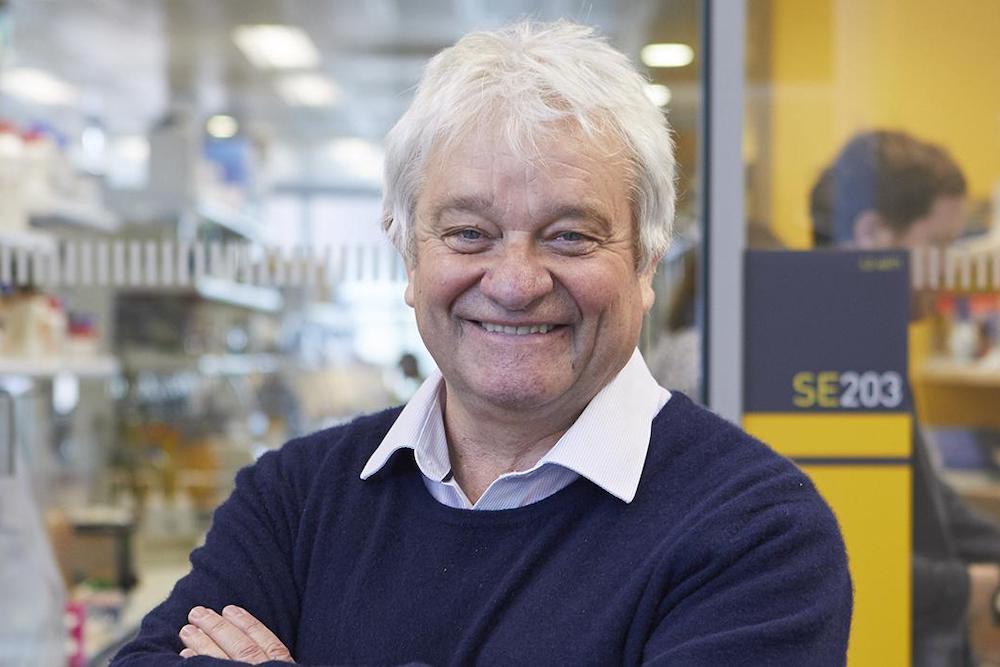
Paul Nurse is a geneticist and former president of the Royal Society, the world’s oldest continuous scientific society. A recipient of the 2001 Nobel Prize in Physiology or Medicine for discovering the protein molecules that control cell division, he is the founding director of the Francis Crick Institute and the author of What Is Life? Before speaking at a Zócalo/Caltech event, “What Is the Meaning of Life?,” Crick talked in our green room about flying glider planes in the French Alps, getting teased as a boy for his active imagination, and discovering (other people’s) home baking during quarantine.
Do you have a favorite time of day in the lab?
Very early in the morning. I start around 7:00. There’s nobody else here. I like the time of the day. I like the coolness of the day. I like the emptiness of the day. I do my best thinking then.
How do you decompress?
I’m a glider pilot and a bush pilot. So I fly old vintage airplanes. I enjoy that because when I’m doing it, I think about nothing else but keeping that plane up there, keeping it safe, avoiding the mountains, and then getting it back down again. And so it completely decompresses, to use your term.
What’s the best place that you’ve piloted?
My favorite place for flying gliders is in the French Alps. I go to a couple of airfields up there where you can really get fantastic flights. I’ve been well over 20,000 feet [altitude] in a glider.
How did you become a pilot?
They had an opportunity at my school, so I went solo at 16 in the glider, and I got a power license somewhat later when I could afford it more. And I’ve just kept it up.
How did you get into trouble as a kid?
Talking to myself whilst walking to school—that got me into trouble with the other kids. They thought I was a bit strange. It would no longer be a problem because they’d assume you were talking on your iPhone. I had a rather vivid imagination and sometimes lost myself in that. So I was a bit of a strange boy and sometimes I got teased over that.
What field or discipline, outside of biology or genetics, do you find yourself most or most often inspired by?
I like history and archeology. I go to the museums a lot, and have even been on archeological digs. I also like the theater a great deal, too.
You’ve mentioned that you’re an amateur astronomer. Do you have a favorite constellation?
I do like Ursa Major, the Great Bear. The Big Dipper, I think it’s called in the U.S., going round the North Pole, always there somewhere. And of course if it’s up in the sky or down near the horizon, it tells you where you are in the year. I think that’s my favorite.
Did the management aspect of the leadership positions you’ve had come naturally to you?
It did. I have never spent, however, my entire working day or working week doing management. It’s always been 50% research, 50% running things. It was a sort of deal I did. I said I’d run things, which I was quite good at but never fully enjoyed it. That was the way I paid back the other half: to do what I liked in the lab.
Do you make an effort—or is it even possible—to track the effects and implications of your research?
I actually don’t track it very closely. What I discovered in yeast, and then more in humans, has been the control of how cells divide, which is important for the growth and development of all living things. Many others have worked on that problem, partly based on what we and others did in yeast. And it also turned out to be quite important for cancer therapy. There’s quite a few drugs being developed now which are based on that, but I’ve had absolutely nothing to do with that.
My own forte is more discovering things rather than developing them into something that’s useful. I’m good at spotting things in nature and then pursuing them, rather than trying to control nature.
What has been your quarantine silver lining?
I’ve discovered the importance of home baking. Not my own home baking, but eating other people’s home baking. And I’d say that’s probably been the most positive feature of it.



